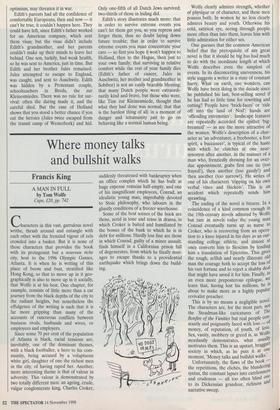Where money talks and bullshit walks
Francis King
A MAN IN FULL by Tom Wolfe Cape, £20, pp. 742 Characters in this vast, garrulous novel writhe, thrash around and entangle with each other with the frenzied vigour of eels crowded into a basket. But it is none of these characters that provides the book with its protagonist but a nouveau riche city, host to the 1996 Olympic Games, Atlanta. It is when he is writing of this place of boom and bust, stratified like Hong Kong, so that to move up in it geo- graphically is also to move up in it socially, that Wolfe is at his best. One chapter, for example, consists of little more than a car journey from the black depths of the city to the radiant heights, but nonetheless the effulgence of the writing is such that it is far more gripping than many of the accounts of rancorous conflicts between business rivals, husbands and wives, or employees and employers.
Since some 70 per cent of the population of Atlanta is black, racial tensions are, inevitably, one of the dominant themes, with a black footballer, a hero to his com- munity, being accused by a voluptuous white girl, daughter of one the richest men in the city, of having raped her. Another, more interesting theme is that of valour in adversity. This valour is demonstrated by two totally different men: an ageing, crude, vulgar conglomerate king, Charles Croker, suddenly threatened with bankruptcy when an office complex which he has built at huge expense remains half-empty, and one of his insignificant employees, Conrad, an idealistic young man, improbably devoted to Stoic philosophy, who labours in the ghastly conditions of a freezer warehouse.
Some of the best scenes of the book are those, acrid in tone and tense in drama, in which Croker is baited and humiliated by the bosses of the bank to which he is in debt for millions. Hardly less fine are those in which Conrad, guilty of a minor assault, finds himself in a Californian prison full of degenerates, from which he finally man- ages to escape thanks to a providential earthquake which brings down the build- ing. Wolfe clearly admires strength, whether of physique or of character, and these men possess both. In women he no less clearly admires beauty and youth. Otherwise his cold, satirical eye, seeing through people more often than into them, leaves him with little admiration for either sex.
One guesses that the common American belief that the prerequisite of any great novel is that it should be big has had much to do with the inordinate length at which Wolfe describes even the simplest of events. In its disconcerting unevenness, his style suggests a writer in a state of constant hurry. What on earth, one wonders, can Wolfe have been doing in the decade since he published his last, best-selling novel if he has had so little time for rewriting and cutting? People have 'brick-faces' or 'ride off into the land of Nod'; hands are `offending extremities'; landscape features are repeatedly accorded the epithet 'big- breasted' — as are the more attractive of the women. Wolfe's description of a char- acter as 'an adventurer, a freebooter, a free spirit, a buccaneer', is typical of the haste with which he clutches at one near- synonym after another, in the manner of a man who, frenziedly dressing for an over- due appointment, grabs first one tie (too frayed!), then another (too gaudy!) and then another (too narrow!). He writes of one of his characters 'tripping on his own verbal vines and thickets'. This is an accident which repeatedly sends him sprawling. The ending of the novel is bizarre. In a coincidence of a kind common enough in the 19th-century novels admired by Wolfe but rare in novels today the young man Conrad eventually turns up as nurse to Croker, who is recovering from an opera- tion to a knee injured in his days as an out- standing college athlete, and almost at once converts him to Stoicism by lending him a translation of Epictetus. This gives the rough, selfish and nearly illiterate old man the courage both to accept the loss of his vast fortune and to reject a shabby deal that might have saved it for him. Finally, in an even more preposterous epilogue, we learn that, having lost his millions, he is about to make more as a highly popular revivalist preacher. This is by no means a negligible novel. The characters are, for the most part, not the Steadman-like caricatures of The Bonfire of the Vanities but real people COm: stantly and poignantly faced with loss — of money, of reputation, of youth, of love. Sex, vanity, snobbery or greed is, as Wolfe mordantly demonstrates, what usuallY motivates them. This is an upstart, braggart society in which, as he puts it at one moment, 'Money talks and bullshit walks. Unfortunately, the flaws of the book .--- the repetitions, the clichés, the blundering syntax, the constant lapses into carelessness and crudeness — all too often blind one to its Dickensian grandeur, richness and narrative sweep.


















































































 Previous page
Previous page